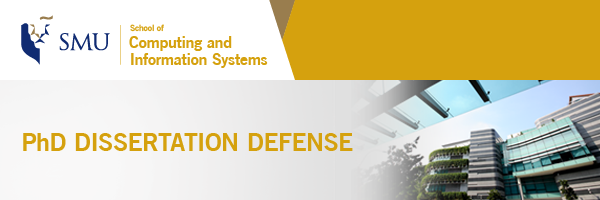|
|
 | | | Decentralized Consensus and Governance for Collaborative Intelligence |  | LIU Huiwen PhD Candidate
School of Computing and Information Systems
Singapore Management University
| Research Area Dissertation Committee Research Advisor Dissertation Committee Member External Member - TANG Qiang, Senior Lecturer (U.S. Associate Professor), School of Computer Science, The University of Sydney
|
| | Date 26 July 2024 (Friday) | Time 8:30am – 9:30am | Venue Meeting room 4.4, Level 4
School of Computing and Information Systems 1,
Singapore Management University,
80 Stamford Road,
Singapore 178902 | Please register by 25 July 2024. We look forward to seeing you at this research seminar. 
|
|
|
| | ABOUT THE TALK The data economy today is becoming increasingly collaborative in nature. In collaborative intelligence, there are two core issues, namely "trust" and "incentive." The core mechanisms to solve these two problems are consensus and tokenization separately.
To solve the trust problem more effectively, we propose a systematic consensus evaluation framework to investigate whether existing consensus algorithms can do so. After a lot of research and evaluation, new challenges arise accordingly in achieving both correct model training and fair reward allocation with collective effort among all participating nodes, especially with the threat of the Byzantine node jeopardizing both tasks. So, we propose a blockchain-based decentralized Byzantine fault-tolerant federated learning framework based on a novel Proof-of-Data (PoD) consensus protocol to resolve both the "trust" and "incentive" components. By decoupling model training and contribution accounting, PoD can enjoy not only the benefit of learning efficiency and system liveliness from asynchronous societal-scale PoW-style learning but also the finality of consensus and reward allocation from epoch-based BFT-style voting. To mitigate false reward claims by data forgery from Byzantine attacks, a privacy-aware data verification and contribution-based reward allocation mechanism is designed to complete the framework.
To solve the incentive problem, we investigated the mainstream DAO governance system from the tokenization governance perspective and proposed a four-layer governance evaluation framework. Through the core decentralized analysis, we aimed to illustrate the challenges of building a truly decentralized governance system and prepare for the design of a relatively perfect tokenization governance system. | | | ABOUT THE SPEAKER Huiwen LIU currently is a Ph.D. Candidate at the School of Computing and Information Systems, Singapore Management University. Her research interests lie in data mining, machine learning, data asset and governance in distributed settings. She has worked extensively on evaluating consensus protocols in both classic settings and more recent applications of societal scale. She also has designed a novel consensus protocol PoD for decentralized learning environment with collaborative data governance. Now, she focuses on incentive and governance for collaborative intelligence and aims to design a governance system for the proposed PoD-based collaborative intelligence system.
Before joining SMU, Huiwen graduated with a Bachelor’s and Master’s degree in Computer and Science Technology from Soochow University in China. During the master’s studies, she mainly researched the big data search, especially activity retrieval. |
|
|
|
|
|